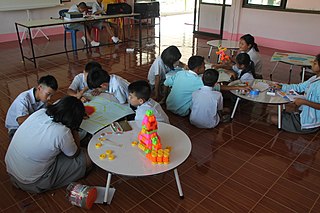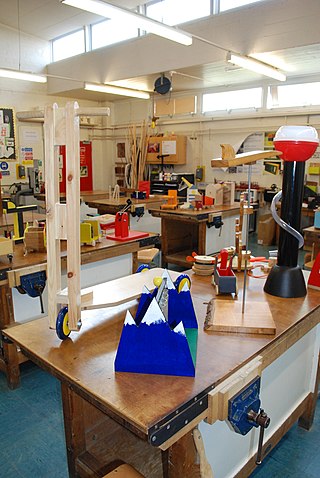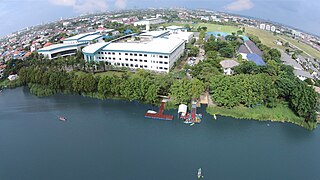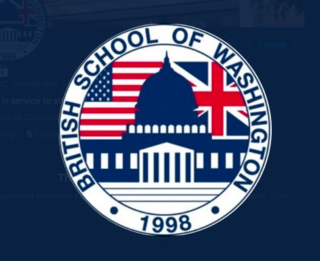Related Research Articles

Pedagogy, most commonly understood as the approach to teaching, is the theory and practice of learning, and how this process influences, and is influenced by, the social, political, and psychological development of learners. Pedagogy, taken as an academic discipline, is the study of how knowledge and skills are imparted in an educational context, and it considers the interactions that take place during learning. Both the theory and practice of pedagogy vary greatly as they reflect different social, political, and cultural contexts.
Gifted education is a sort of education used for children who have been identified as gifted or talented.
Experiential education is a philosophy of education that describes the process that occurs between a teacher and student that infuses direct experience with the learning environment and content. This concept is distinct from experiential learning, however experiential learning is a subfield and operates under the methodologies associated with experiential education. The Association for Experiential Education regards experiential education as "a philosophy that informs many methodologies in which educators purposefully engage with learners in direct experience and focused reflection in order to increase knowledge, develop skills, clarify values, and develop people's capacity to contribute to their communities". The Journal of Experiential Education publishes peer-reviewed empirical and theoretical academic research within the field.

In education, a curriculum is the totality of student experiences that occur in an educational process. The term often refers specifically to a planned sequence of instruction, or to a view of the student's experiences in terms of the educator's or school's instructional goals. A curriculum may incorporate the planned interaction of pupils with instructional content, materials, resources, and processes for evaluating the attainment of educational objectives. Curricula are split into several categories: the explicit, the implicit, the excluded, and the extracurricular.
Higher education in Mauritius includes colleges, universities and other technical institutions. Public university education has been free to students since 2019. The sector is managed by the Higher Education Commission (HEC) which has the responsibility for allocating public funds, and fostering, planning and coordinating the development of post-secondary education and training. Formerly the Tertiary Education Commission, in 2020 it was reformed into the HEC and a separate Quality Assurance Authority (QAA) for auditing of qualifications.

Project-based learning is a teaching method that involves a dynamic classroom approach in which it is believed that students acquire a deeper knowledge through active exploration of real-world challenges and problems. Students learn about a subject by working for an extended period of time to investigate and respond to a complex question, challenge, or problem. It is a style of active learning and inquiry-based learning. Project-based learning contrasts with paper-based, rote memorization, or teacher-led instruction that presents established facts or portrays a smooth path to knowledge by instead posing questions, problems, or scenarios.
The International Baccalaureate Primary Years Programme (PYP) is an educational programme managed by the International Baccalaureate (IB) for students aged 3 to 12. While the programme prepares students for the IB Middle Years Programme, it is not a prerequisite for it. The subject areas of the PYP are language, social studies, mathematics, science, technology, arts; personal, social and physical education. Students are required to learn a second language during the programme. Assessment is carried out by teachers according to strategies provided by the IB and concerning guidelines to what the students should learn specified in the curriculum model.
The International Baccalaureate Middle Years Programme (MYP) is an educational programme for students between the ages of 11 and 16 around the world as part of the International Baccalaureate (IB) continuum. Middle Years Programme is intended to prepare students for the two-year IB Diploma Programme.

Design and Technology (D&T) is a school subject taught in the United Kingdom to pupils in primary and secondary schools. It first appeared as a titled subject in the first National Curriculum for England in 1990. It has undergone several reviews when the whole National Curriculum has been reviewed, the most recent in 2013.
International education refers to a dynamic concept that involves a journey or movement of people, minds, or ideas across political and cultural frontiers. It is facilitated by the globalization phenomenon, which increasingly erases the constraints of geography on economic, social, and cultural arrangements. The concept involves a broad range of learning, for example, formal education and informal learning. It could also involve a reorientation of academic outlook such as the pursuit of "worldmindedness" as a goal so that a school or its academic focus is considered international. For example, the National Association of State Universities prescribes the adoption of "proper education" that reflects the full range of international, social, political, cultural, and economic dialogue. International educators are responsible for "designing, managing, and facilitating programs and activities that help participants to appropriately, effectively, and ethically engage in interactions with culturally diverse people and ideas."

International schools are private schools that promote education in an international environment or framework. Although there is no uniform definition or criteria, international schools are usually characterised by a multinational student body and staff, multilingual instruction, curricula oriented towards global perspectives and subjects, and the promotion of concepts such as world citizenship, pluralism, and intercultural understanding; most are private schools. Many international schools adopt a curriculum from programmes and organisations such as the International Baccalaureate, Edexcel, Cambridge International Education, FOBISIA, International Primary Curriculum, or Advanced Placement. International schools often follow a curriculum different from the host country, catering mainly to foreign students, such as members of expatriate communities, international businesses or organisations, diplomatic missions, or missionary programmes. Admission is sometimes open to local students to provide qualifications for employment or higher education in a foreign country, offer high-level language instruction, and/or foster cultural and global awareness.

The British International School of Washington (BISW) is a private, nonsectarian, co-educational British school located in the Georgetown neighborhood near the border of the Georgetown and Glover Park neighborhoods in Washington, D.C. BISW educates pupils between the ages of 2 and 18. BISW was originally founded in September 1998 by Dr. Lesley Stagg. In 2013, BISW joined Nord Anglia Education, an international education provider owned by the Canada Pension Plan Investment Board. As of 2019, Nord Anglia operated 66 international schools in 30 countries with over 61,000 students. BISW leases property from Georgetown University, yet GU's Green Building was purchased in 2009 by the entity that is now HUB Properties Trust.
Eklavya is an Indian NGO based in Bhopal, Madhya Pradesh working in the field of education. It was registered as an all India in 1982. The organization is named after Eklavya, the protagonist of a story in the Mahabharat, for his determination to learn even in the absence of a teacher.
Eleanor Ruth Duckworth is a teacher, teacher educator, and psychologist.
Rome International School (RIS) is a private international school in Rome, Italy. The school offers international education to children aged 2 to 18 years from Nursery through to Grade 13. The language of instruction is English. RIS is an International Baccalaureate School offering the IB Primary Years Programme in the Elementary School and the IB Diploma Programme in the last two years of High School. Students in Grades 10 and 11 sit the Cambridge IGCSE.
Global citizenship education (GCED) is a form of civic learning that involves students' active participation in projects that address global issues of a social, political, economic, or environmental nature. The two main elements of GCE are 'global consciousness'; the moral or ethical aspect of global issues, and 'global competencies', or skills meant to enable learners to participate in changing and developing the world. The promotion of GCE was a response by governments and NGOs to the emergence of supranational institution, regional economic blocs, and the development of information and communications technologies. These have all resulted in the emergence of a more globally oriented and collaborative approach to education. GCE addresses themes such as peace and human rights, intercultural understanding, citizenship education, respect for diversity and tolerance, and inclusiveness.
Curricula in early childhood care and education (ECCE) or early childhood curriculum address the role and importance of curricula in the education of young children, and is the driving force behind any ECCE programme. It is ‘an integral part of the engine that, together with the energy and motivation of staff, provides the momentum that makes programmes live’. It follows therefore that the quality of a programme is greatly influenced by the quality of its curriculum. In early childhood, these may be programmes for children or parents, including health and nutrition interventions and prenatal programmes, as well as centre-based programmes for children.
Nexus International School Malaysia is a private international school established in 2008 and based in Putrajaya, Malaysia. Part of the Taylor's Education Group, the school offers boarding facilities and education for Early Years, Primary, Secondary, and Pre-university students.
Multisensory learning is the assumption that individuals learn better if they are taught using more than one sense (modality). The senses usually employed in multisensory learning are visual, auditory, kinesthetic, and tactile – VAKT. Other senses might include smell, taste and balance.

Educational management refers to the administration of the education system in which a group combines human and material resources to supervise, plan, strategise, and implement structures to execute an education system. Education is the equipping of knowledge, skills, values, beliefs, habits, and attitudes with learning experiences. The education system is an ecosystem of professionals in educational institutions, such as government ministries, unions, statutory boards, agencies, and schools. The education system consists of political heads, principals, teaching staff, non-teaching staff, administrative personnel and other educational professionals working together to enrich and enhance. At all levels of the educational ecosystem, management is required; management involves the planning, organising, implementation, review, evaluation, and integration of an institution. Research in educational management should explore the dynamic interplay among educational leaders, their followers, and the broader community to enhance the quality of teaching and learning outcomes.
References
- ↑ Book: Hayden, M., Levy, J. & Thompson, J. (2015) The SAGE handbook of research in International Education. London: SAGE Publications Ltd, 2015.
- ↑ Book: Walker, G., Hayden, M. & Thompson, J. (2002) Criteria for curriculum continuity in international education. London: Routledge, 2002. Chapter 1: Drennen, H. Criteria for curriculum continuity in international education
- ↑ Book: International Education and Schools: Moving Beyond the First 40 Years. Hayden, M., and Thompson, J. (2013)
- ↑ Journal: Hayden, M., and Thompson, J. (2013) UNESCO: International Institute for Educational Planning. International schools: growth and influence. Fundamentals of Educational Planning. Vol 92.
- ↑ Journal: Bunnell, T. (2010) Journal of Curriculum Studies. Volume 42, Issue 4. The momentum behind the International Primary Curriculum in schools in England. Pages 471-486.
- ↑ Book: Taking the IPC Forward - Engaging with the International Primary Curriculum. Ed. Hayden, M., and Thompson, J. (2012)
- ↑ Book: Hayden, M., Levy, J. & Thompson, J. (2015) The SAGE handbook of research in International Education. London: SAGE Publications Ltd, 2015, p. 95.
- ↑ Book: Taking the IPC Forward - Engaging with the International Primary Curriculum. Ed. Hayden, M., and Thompson, J. (2012)
- ↑ Resources: IPC Curriculum Guide. Fieldwork Education. (2020)
- ↑ Resources: IPC Curriculum Guide. Fieldwork Education. (2020)
- ↑ Crystal (2021-07-29). "About". Fieldwork Education. Retrieved 2021-07-29.